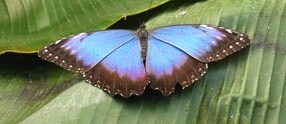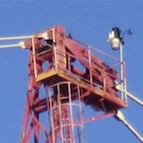| ISSUE 06/2010 01 Events + Featured 02 Marine Virus a Major Player in Ocean Health 03 Superconductors' 'Excited' Behaviour 04 Physicists Help Trap Antimatter 05 Class Connections + Kudos |
 |
UBC Science Connect |
| NEWS AND EVENTS FOR UBC SCIENCE ALUMNI | VIEW HTML VERSION |

|
Greenland Ice Sheet Flow Driven by Short-Term Weather Extremes, Not Gradual WarmingSudden changes in the volume of meltwater contribute more to the accelerated spread--and eventual loss--of the Greenland ice sheet than gradual increases of temperatures, according to a new study by a UBC glaciologist. Since the 1990s, the Greenland ice sheet has been losing approximately 100 billion tonnes of ice per year--a process that most scientists agree is accelerating, but has been poorly understood. Some of the loss has been attributed to accelerated glacier flow, or spread, towards ocean outlets. Now a new study in the journal Nature by Earth and Ocean Sciences researcher Christian Schoof indicates that a steady meltwater supply from gradual warming may in fact slow down glacier flow. It is short-term, heavy water input that appears to cause glaciers to speed up and spread, resulting in accelerated melt. |


The Physics of Light and Colour at the Faraday Science Show
The 7th annual Faraday Science Show explores light and colour. Learn how optical illusions work, how to create lights of different colours, and which Christmas lights consume the least amount of energy. Fun for the whole family! Festive Bach Cantatas for Christmas Algorithms Meet Art, Puzzles, and Magic |
 |

UBC Scientists Call for Bold Vision in Biodiversity Research
Canada needs a bold vision to fully understand its biodiversity resources. This is a central finding of a group of 14 eminent experts, including two UBC scientists, brought together by the Council of Canadian Academies. UBC professors Wayne Maddison and Sarah Otto were part of an expert panel that was charged with assessing the state and trends of taxonomy--the science that discovers, distinguishes, classifies and documents living things--in Canada. The report observes that failure to understand Canadian biodiversity could have significant consequences for ecosystems, the economy, innovation potential and society. "Taxonomists are critical for identifying and protecting species at risk," said Otto. "We can only protect that which we know about and we only know a small fraction of the species on earth." |

Help Boost a Science Student's Career at Science Alumni Career Nights |
|

|
UBC Career Services and the Faculty of Science are looking for alumni who are keen to discuss their career paths with students at one of our upcoming Career Nights. Students are eager to understand how you applied your degree to the working world, what challenges you faced along the way, and get some tips to help them succeed. Interested in participating? Please complete this form and we'll contact you with more details. |

World's Largest, Most Complex Marine Virus is Major Player in Ocean Ecosystems |
||
|
UBC researchers have identified the world's largest marine virus--an unusually complex 'mimi-like virus' that infects an ecologically important and widespread planktonic predator. Cafeteria roenbergensis virus has a genome larger than those found in some cellular organisms, and boasts genetic complexity that blurs the distinction between 'non-living' and 'living' entities. "Virus are classically thought of small, simple organisms in terms of the number of genes they carry," says UBC professor Curtis Suttle, an expert in marine microbiology and environmental virology and lead author of the study.  |
 |
"Much of the genetic machinery we found in this virus you would only expect to find in living, cellular organisms, including many genes required to produce DNA, RNA, proteins and sugars." Viruses cannot replicate outside of living host cells and they depend on proteins provided by the cell, a boundary that is often used to delineate 'non-living' from 'living' organisms. Giant viruses challenge this definition, as they still need a cell to replicate, but encode in their own genome most of the proteins required for replication. "Although there have been numerous studies of specific microRNA types in a few cell types, this study provides the first unified and comprehensive data set. We really wanted to see the big picture of how the microRNA expression is changing at each stage of differentiation." |

Alumni Invited to Comment on UBC Science Strategic Plan |
|

|
UBC Science is building on UBC's new strategic plan, Place and Promise, by developing a strategic plan for the Faculty. The Dean of Science is pleased to share a working draft of that plan, and would like to encourage you to review the draft and share your comments. |

Dreaming of a White Christmas? |
|

|
UBC Science researchers from the department of Earth and Ocean Sciences have mounted a weather station to a crane at the earth sciences building construction site, and are sharing the live weather reports with you! |

'Incoherent Excitations' Govern Key Phase of Superconductor Behaviour |
||
|
New research by UBC physicists indicates that high-temperature superconductivity in copper oxides is linked to what they term 'incoherent excitations'--a discovery that sheds light on the electronic response of these materials before they become superconducting. The study marks the first time researchers have been able to directly measure when electrons in a super conductor behave as independent well-defined particles, and when they evolve into ill-defined many-body entities.  |
 |
"We've never been able to directly quantify the nature of electron behaviour within these materials across the entire phase diagram--the transition from non-superconducting to superconducting behaviour," says Associate Professor Andrea Damascelli, Canada Research Chair in Electronic Structure of Solids with the Department of Physics and Astronomy. "A combination of advanced spectroscopic techniques, and access to very pure cuprate crystals produced at UBC have allowed us to measure what's going on below the surface of a high-temperature superconducting material through the entire progression of different phases." |

Happy Holidays! |
|

|
The Faculty of Science wishes all of our zoologists, geologists, botanists, chemists, pharmacologists, marine biologists, immunologists, microbiologists, actuaries, professors, researchers, oceanographers, mathematicians, programmers, |

UBC Physicists Help International Team Trap Antimatter |
||
|
An international team including UBC physicist Walter Hardy, TRIUMF researchers and collaborators from across Canada have trapped antimatter, marking the end to a ten-year race to isolate the enigmatic particles.  |
 |
"Studying anti-hydrogen--an anti-proton and an-anti-electron--to the same precision as we can study hydrogen has been a dream project for some time," says Hardy, an expert in cuprate superconductors and professor with the Department of Physics and Astronomy. "The difficulty is that anti-matter is produced at high energies, and bringing the two components together to form the anti-atoms, and then getting them to sit still long enough to do the required measurements, is extremely difficult." |

All I Want for Christmas is Blue |
|

|
Searching for the perfect gift to tuck under the tree this Christmas? Give the gift of biodiversity! With a membership to UBC's newly opened Beaty Biodiversity Museum, you'll give the gift that keeps on giving, with year-round admission to the museum's 20,000 square feet of collections exhibits and the largest blue whale skeleton displayed in Canada! |

UBC Science Likes You |
|

|
Visit us on Facebook and you can like us too! Connect with classmates, share stories and updates and discover what's new by checking out the UBC Science page on Facebook. We'll be posting news from the Faculty, as well as volunteer opportunities and event updates--and we promise never to tag you in any unflattering photos. |


Guy Dean, |
 |

Maddison Receives Museum Award
UBC evolutionary biologist and Beaty Biodiversity Museum Director Wayne Maddison has received the 2010 Bruce Naylor Award. This national award, presented by the Alliance of Natural History Museums of Canada, recognizes exceptional contributions to the museum-based study of natural history in Canada. Government, Industry Support to Help 'De-Noise' Seismic Data $3 Million in Health Funding Targets Microbial Impact on Immune System, Asthma Nayar Named Joint Winner of the IUCN-Reuters-COMplus Reporting Award New CRC to Focus on Nanoscience, Joins Eight Renewals at UBC Science |

 |
|

|
» December, 15th Century
Botanist Nicholas Claus discovers a beautiful new species of evergreen coniferous tree near his home in Northern Germany. He's so proud of his discovery, he takes the tree home and decorates it with candles. Friends and family place gifts under it to congratulate him on his new taxonomic prize. |

 | ||
You're receiving Science Connect because, as a UBC Science alumni or supporter, you've given the university permission to contact you. And while we hope you find our e-magazine interesting, we take your privacy seriously, and have made it easy for you to: | ||
 |
||

 |
| © 2010, UBC Faculty of Science | Privacy | Update your contact information |

